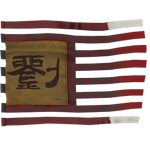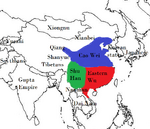
Shu Han, often known simply as Shu, was one of the Three Kingdoms of China, existing from 223 to 263. Shu Han's founder was Liu Bei, who claimed descent from the rulers of the Han dynasty, therefore claiming that his rule was legitimate. Shu was usually in alliance with Eastern Wu against Cao Wei, with its generals, Zhuge Liang and Jiang Wei launching several northern expeditions against Wei's forces. Shu would fail in its many invasions, and a massive Wei army subjugated Shu in 263 after years of warfare that drained Shu of manpower and resources.
Background[]

Liu Bei was a virtuous man whose dream was to restore the Han dynasty to its former glory. He founded the Kingdom of Shu after conquering Yi Province from his cousin Liu Zhang in 214 AD, and made Chengdu their capital. Liu Bei was a loyalist to the Han Dynasty, which was founded by his ancestor Liu Bang, the creator of the Han dynasty.
Liu Bei's Forces fought primarily against Cao Cao, who claimed to be Prime Minister for Liu Xie, but also fought with his ally Sun Quan, who was squabbling over Jing Province with his general Guan Yu.
In 219 AD, the refusal of Guan Yu to leave Jing as promised led to his death at the Battle of Fan Castle that year. In response, Liu Bei led an army of 100,000 troops into the Eastern Wu, but was defeated at the Battle of Yiling three years later.
After Yiling, he declared himself "Emperor of Shu" when Cao Pi deposed Emperor Liu Xie and proclaimed himself "Emperor of Wei", and soon after he declared independence, Sun Quan of Wu followed suit.
History[]

Location of the Three Kingdoms, 223.
Liu Bei left most of his power to Zhuge Liang after Yiling, and died in 223 AD in Baidi Castle, and gave Zhuge Liang the right to take power if his son, Liu Shan proved weak. However, Zhuge Liang served him loyally until his death.
His first move was to secure Shu's southern borders from Meng Huo's barbarians. In the 225 Nanman Campaign his generals broke the spirits of the Nanman people to defeat them, and eventually, Meng Huo surrendered. With the surrender of Meng Huo, Zhuge Liang could focus northwards.
In 228 AD, two years after the death of Cao Pi, he invaded Wei, and gained Jiang Wei as a general after his defection at the Tian River. Jiang Wei and Zhuge Liang managed to save Ma Su's force from destruction at Jieting, and in 229 AD, they captured Chen Cang Castle from Sima Yi's Wei army. In 230 AD, Wei was deprived of Zhang He, their finest field commander, after twin defeats at Mt. Qi and Mumen, but these victories for Shu were negated when Zhuge Liang died during the final battle at the Wuzhang Plains in 234 AD; he did not die in battle, but of illness.
Jiang Wei took over and won the battle, but retreated to Shu and started to rebuild the empire. Shu went into decline after Zhuge's death, and Liu Shan relied on the unwise minister Huang Hao as support for his actions. From 249 to 262 AD, Jiang Wei launched a series of failed invasions of Wei, and in 263 AD, Shu Han was conquered by Wei's general Deng Ai.
